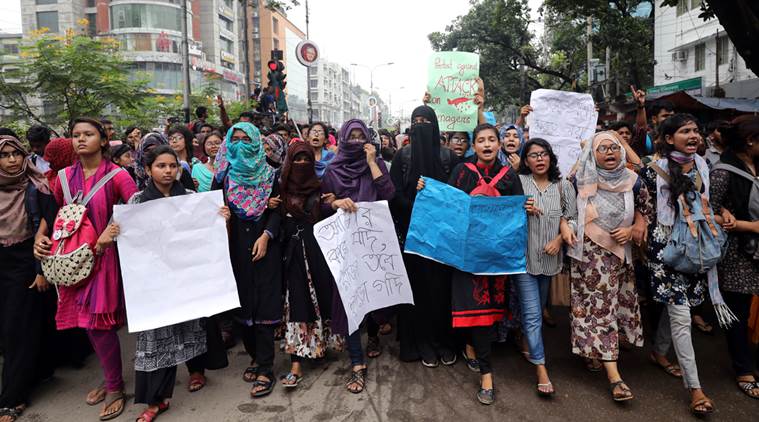Bangladesh increases punishment for fatal traffic accidents to five years to end protests
As tens of thousands of students protested for a ninth day over the deaths of two teenagers killed by a speeding bus in Dhaka, the government increased the punishment for road accident deaths to five years.

Students shout slogans as they protest over recent a traffic accident that killed a boy and a girl, in Dhaka. (Reuters photo)
As tens of thousands of students protested for a ninth day over the deaths of two teenagers killed by a speeding bus in Dhaka, the government increased the punishment for road accident deaths to five years.
However, the Dhaka Tribune and Prothom Alo reported that the government had approved a new legislation to increase the punishment for road accidents to five years imprisonment. The highest punishment was earlier three years imprisonment. Reuters had earlier quoted an unnamed law ministry official, who said they were considering the capital punishment for those guilty of carrying out road accidents.
48s
Prime Minister Sheikh Hasina, who faces an election due by the end of the year, has accused her political rivals of trying to stir up anti-government sentiment using the deaths as a pretext. The opposition has denied involvement.
The protests that have paralysed Dhaka’s streets
The crowded capital of 18 million has been paralysed by angry school and college students demanding changes to transport laws following the July 29 deaths, after a privately-operated bus ran over a group of students.
Defying government warnings to end the protests, students in school uniforms have blocked most of Dhaka’s roads, setting up checkpoints that let through only emergency vehicles.
Police said they were still investigating Sunday’s attack on a car carrying the US ambassador to Bangladesh by a group of armed men, some riding motorcycles. There were no injuries, but two vehicles were damaged.
The US embassy said it was not in a position to comment until the investigation was complete. Ambassador Marcia Bernicat was returning from dinner at the time of the attack.
Earlier the embassy had criticised the police crackdown on the protesters, whom it described as having “united and captured the imagination of the whole country”.
Police had fired tear gas to break up the protests on Sunday and last week beat up some students in a bid to get them to disperse.
Prominent photographer arrested over comments
Police detained social activist and photographer Shahidul Alam who had posted comments that a student wing of Hasina’s ruling party was trying to attack the protesters.
Alam’s organisation, Drik Picture Library, said 30 to 35 men in plainclothes swept into his Dhaka apartment building, saying they were police detectives, and took him into custody.
Alam was screaming as he was forced into a car, it quoted security guards at the building as saying.
Dhaka’s additional deputy commissioner of police Obaidur Rahman said Alam was picked up for questioning, but gave no details.
Rights group Amnesty International called for Alam’s immediate and unconditional release, saying he had been detained following an interview to Al-Jazeera English on the Dhaka protests.
Rights group Amnesty International called for Alam’s immediate and unconditional release, saying he had been detained following an interview to Al-Jazeera English on the Dhaka protests.
“There is no justification whatsoever for detaining anyone for solely peacefully expressing their views,” Omar Waraich, Amnesty’s deputy South Asia director, said in a statement. “The Bangladeshi government must end the crackdown on the student protesters and people speaking out against it.”
More than 4,000 people die in road accidents each year in Bangladesh, one of the world’s highest rates. Traffic laws are poorly enforced and the students blame the private bus network for mishaps in a city choked by massive traffic jams.
Sheikh Shafi, a polytechnic student injured in a protest on Saturday, said one problem was that bus drivers must work long hours as they do not receive monthly salaries but are paid commissions based on passenger numbers instead.
“Our demand is that the owners must appoint them and they will work a maximum of 10 hours. The commission-based system must be eliminated,” said Shafi, whose brother died in a road accident in 2015.
with inputs from Reuters







































No hay comentarios:
Publicar un comentario